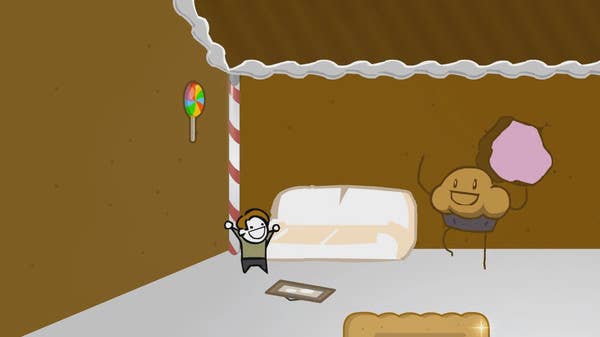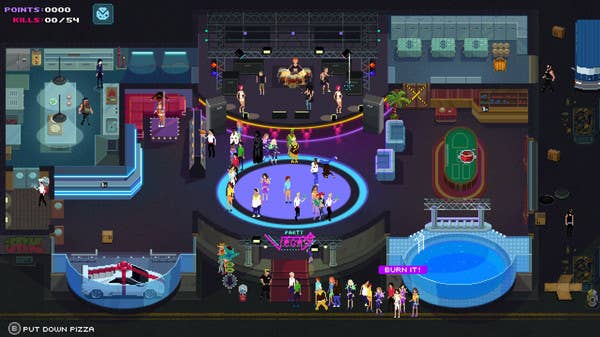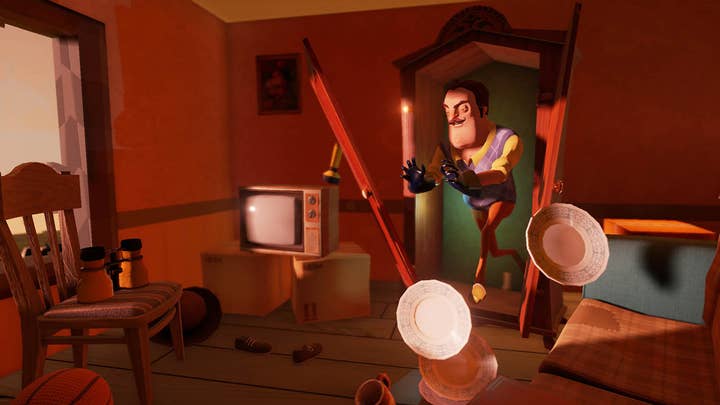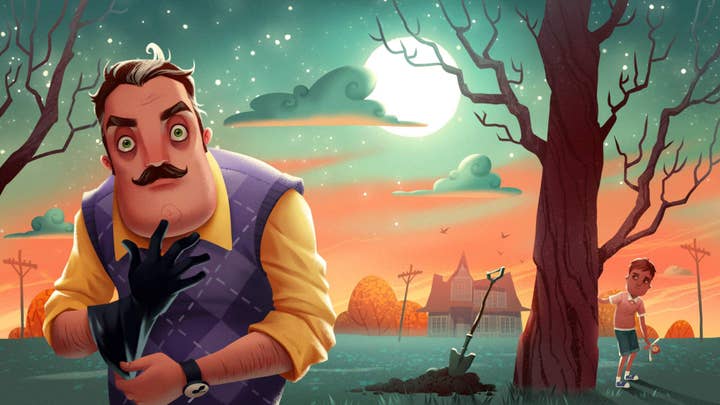TinyBuild: Development to publishing, and back again
Alex Nichiporchik shares why the publisher is investing in internal development studios, and the lessons of Hello Neighbor's success
In 2011, when Alex Nichiporchik founded publisher tinyBuild with Tom Brien, he thought he was starting a development studio.
The year before he had been working at a company called Spil Games in the Netherlands, where he cultivated an interest in Flash games. After watching the rise of the Flash game Meat Boy, which became the indie darling Super Meat Boy, Nichiporchik wanted in. That's how he found Brien, whose flash game No Time to Explain seemed a good fit for a similar formula. They raised $26,000 from a $7,000 goal target through Kickstarter, and used that money to develop the game for PC.
But Steam, a closed platform at the time, didn't want it, so tinyBuild launched it independently. No Time to Explain made its money back and not much else, and tinyBuild was scrapped almost entirely for around a year.
That's when Steam Greenlight came along. In 2013, tinyBuild released No Time to Explain as one of the first games greenlit on Steam. Speaking to GamesIndustry.biz at GDC, Nichiporchik says it left the small company entirely burned out, but with "a bucket of cash." TinyBuild didn't want to develop games anymore, but it didn't want to waste its success. And thus the developer became a publisher.
"We went from two guys working on an indie game to being two guys working on more than a single indie game, and then became a publisher organically"
"We invested into a game called Speedrunners, which is still our top-selling game," Nichiporchik says. "We've sold like seven million units I think. This game just took off like crazy. And then other people started pitching games to us, even though we weren't technically publishers -- we were just co-developing. That's how our publishing started. We went from two guys working on an indie game to being two guys working on more than a single indie game, and then became a publisher organically."
TinyBuild has focused on publishing ever since, and it now boasts a steady release schedule and a bulky portfolio, having launched 14 games in 2016, eight games in 2017, and four more in 2018. However, it recently made a subtle shift, almost back to its roots. About 18 months ago, tinyBuild raised $3.75 million in seed funding through the Makers Fund, which it invested back into six internal studios. And those studios are developing games, with tinyBuild as their publisher.
Originally from Latvia, Nichiporchik started tinyBuild in the Netherlands, and eventually moved again to Seattle with the company's headquarters, which now exists alongside a main European office located in Amsterdam. The company is also hiring internally to spread into other markets as well; it recently brought in a community manager for Brazil, and is looking for the same roles for China and Russia.

Despite the geographic distance, Nichiporchik says there are a number of good reasons for focusing on Eastern Europe for its studios, as well as a few challenges to the locations of both those studios and the main office.
"We did experiment with creating studios in Seattle or Amsterdam, and it was way too expensive, too much risk. But in Eastern Europe, a game can completely flop but it will still make a profit through deals, or through the fact that the team got experience working on something that will help them with the next game. We can make four or five games on the same budget that would get us one game in Seattle, San Francisco, or Amsterdam.
"In Eastern Europe, a game can completely flop but it will still make a profit through deals or through the fact that the team got experience"
"Being in Seattle is great because you can literally knock on Valve's, Epic's, Nintendo's, Microsoft's doors and have a chat. Then Amsterdam is great because Amsterdam has a really high standard of life. Having our European base there means we can attract talent from anywhere around the world. The challenge of being a developer in Eastern Europe is not necessarily the lack of connections, but there's a cultural difference. If you came to Russia, you'd probably feel a bit lost in the cultural sense. That's how they feel here."
Nichiporchik also looks at the struggles regarding geographic location and sees the current tinyBuild setup as a way to stay independent.
"A lot of developers are in regions where living costs are quite high. The arrangements they have where you need dozens of millions of dollars to develop something are arrangements where you get security for your employees first and foremost. Then on the back end, you might not get as much buffer to build the next game yourself. You have to keep working in these partnerships then, or the financial risks involved are really scary.
"At the same time, if I was at a studio of that size and I didn't know what to do after the project was done and my burn rate was really high, an acquisition sounds like a great idea, because then you have financial security and the team that you built up gets to live."

Our conversation, which references Microsoft's numerous acquisitions of independent developers last year, turns to distinctions between AAA, AA, and independent developers. It's a distinction Nichiporchik sees both as "blurring very fast" and also driving smaller developers of a certain size into the arms of bigger companies. He says that tinyBuild, too, is blurring those lines, and it may go to a $60 price point for its games somewhere down the line as it grows in scope. However, it will avoid other AAA markers like $50 million budgets.
Though tinyBuild certainly had success before, one of the major reasons the publisher has thrived in the last few years has been thanks to a single IP: Hello Neighbor. The stealth horror game about moving in across the street from a creepy gentleman with a strange secret in his house had what looks on paper to be a rough launch. But Nichiporchik attributes the game's unconventional success to a number of factors -- aside from merchandising, which came later -- including multiple pre-release builds of the game, YouTube and Twitch success, and several total accidents.
"When we announced the game, we released the very first build we had. It was supposed to be internal, but we shared it. And everyone loved it. So YouTubers started making videos. And there were puzzles in it; not puzzles like game puzzles, but lore puzzles. Mysteries that people really liked. During the course of I think 18 months, we released five more builds, and each one kept getting more views, more hype, and more mysteries.
"Everyone felt like they were actually involved in the development -- because they were. We watched them play. We had analytics built in. We were figuring out what worked and what didn't."
Not everything went according to plan. Nichiporchik mentions that, with the early builds of the game, content that players weren't supposed to see or access became available, forcing tinyBuild to reconsider how it had planned to reveal information. But in the end, framing Hello Neighbor as a mystery worked, and gradually began to spill out into other media as well.

"Sometimes when you announce something, it takes off, and companies aren't always able to keep up with the hype," he explains. "So [with Hello Neighbor] we hired a licensing agency to do plushies, towels, whatever. But the biggest thing that happened was a book series. We published two books last year, and between those two books we sold one million units. It makes sense for that brand to interact with more media because the lore behind that game can be explored in multiple different mediums.
"Publishing as it is, for indie publishers, is not a sustainable business. It's a business anyone can replicate, and that's a problem"
"When you create a game, you have to think about the universe surrounding it, and how, if that game really takes off, you could build more genres within that thing... I think it's like the Marvel Cinematic Universe (MCU). In the MCU, they want to make a space saga, Guardians of the Galaxy, and that was totally different from anything else, but it still took place in the same universe and could combine into something bigger."
Though Nichiporchik is constantly looking for the "next Hello Neighbor," he also acknowledges that the confluence of events that led to the game's success is not something the publisher can force to happen again. It was unique to the IP, the circumstances, the timing, and everything else. "You can't show a magic trick twice to the same person," he says.
However, he notes that tinyBuild learned a number of good lessons to apply the next time it has an IP show similar signs of popularity. And now with multiple funding rounds (including a recent one for $15 million this past February), the publisher can both bolster the Hello Neighbor IP -- currently, tinyBuild's studios have a whopping six more games in the Hello Neighbor universe in development -- as well as "make more bets on things that can become franchises."
"In general, I think publishing is at an interesting turning point," he says. "Publishing as it is, for indie publishers, is not a sustainable business. It's a business anyone can replicate, and that's a problem. So the value you add to developers has to be much more than just money or expertise. Some publishers can just scam developers into deals. The unsustainability of it makes it scary, because maybe five or six years ago there was an influx of indie developers into the scene, and now there's an influx of indie publishers.
"If you don't provide value that is very obvious and transparent, you're going to have a hard time. And it's not just money. Money is the easiest part in games. You can get money from multiple different sources. But how do you make something and then grow it in five years into a sustainable brand? That's what TinyBuild's about.
"All the games we're signing now, we build a plan for them: if this initial title takes off in this manner, then what do we do? What is the world behind it? How do we move into merchandising? How do we do movies down the line, or animated shows? All of those things are really key."

